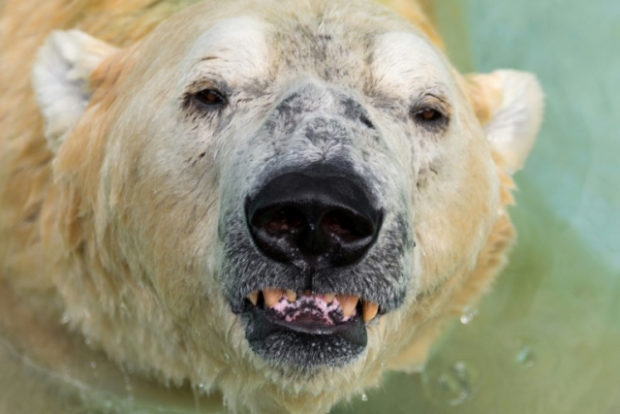Inuka, first polar bear born in the tropics, is put down

Image: TOH Ting Wei – AFP/File
Inuka, the first polar bear born in the tropics, was put down Wednesday after a rapid decline in health, with Singapore Zoo mourning the loss of one of its best-loved animals.
The bear, whose name means “Silent Stalker” in Inuit, had reached the grand old age of 27 — into his 70s in human years and two years older than the average lifespan of the creatures in captivity.
Born at the zoo, Inuka was particularly popular with visitors due to his playful antics in his enclosure.
But in recent years he had suffered age-related ailments including arthritis, and an examination at the start of this month revealed his health was failing markedly.
His weakened limbs had trouble supporting his body and he developed cuts on his paws and a wound on his abdomen.
Article continues after this advertisementAfter a final check-up, vets found that Inuka’s health had not improved despite intensive treatment and decided not to revive him from anesthesia.
Article continues after this advertisement“Singaporeans have known Inuka from the time he was a cub, and have seen him growing up and aging,” said Mohan Ponichamy, one of his keepers.
“It has been a privilege and honor being his caregiver, but difficult as it may be, it would not have been fair to prolong his suffering.”
Inuka had been put on a “seniors programme” at the zoo for the past five years to help elderly animals deal with the effects of ageing.
He had slowed down in recent months and became less interested in his daily play sessions.
Zoo’s last polar bear
Singaporeans greeted the bear’s death with a rare outpouring of grief, with over 3,000 people reacting on the Facebook page of the Straits Times.
Housewife Pamela Lee said she brought her four-year-old daughter Bliss to see Inuka at the zoo after news broke that he had been sick.
“It’s a loss… she wanted to come and see him but it’s too late, I suppose,” Lee said.
Zoo officials said a private memorial would be held on Thursday.
Inuka was born on December 26, 1990. His father Nanook was caught in the wild in Canada while his mother, Sheeba, came from Cologne Zoo in Germany.
His death marks the end of an era for the zoo, which has said it will not keep any more polar bears.
As few as 22,000 polar bears are thought to remain in the wild, according to environmental group WWF. The International Union for Conservation of Nature classifies them as a vulnerable species.
They are typically found in places with cold climates — making Singapore, where daytime temperatures rarely dip below 25 degrees Celsius (77 degrees Fahrenheit), an unusual location. NVG
RELATED STORIES:
Coldilocks, the oldest captive polar bear in the US, dies